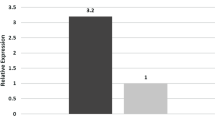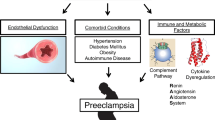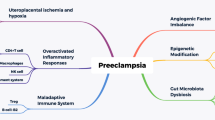Abstract
Background
Preeclampsia is a type of pregnancy-related disease that is not fully understood underlying mechanisms of it till now. Reported results from autophagy-related studies in PE show some controversial roles of this mechanism in PE development and progression. In this study, we aimed to evaluate the autophagy process in preeclampsia women.
Materials and methods
Peripheral blood was taken from 50 preeclampsia women and 50 healthy pregnant women. After PBMC isolation, Total RNA and total protein were extracted from PBMCs to cDNA synthesis and real-time PCR and western blotting, respectively. Atg5, Atg7, beclin1, LC3B, FOXO1, FOXO3a, FOXO4, and FOXO6 genes were evaluated using real-time PCR. Atg5, beclin1, LC3B, and FOXO1 expression at the protein level was evaluated by the western blot technique.
Results
Real-time PCR results showed an increased expression of Atg5, Atg7, beclin1, LC3B, FOXO1, FOXO3a, FOXO4, and FOXO6 genes in PE patients compared to the healthy pregnant women and also in LOPE patients in comparison with EOPE cases. Western blotting results revealed higher expression of Atg5, beclin1, LC3B, and FOXO1 proteins in PE women compared to healthy pregnant group and in LOPE patients in comparison with EOPE cases. Our findings revealed a positive correlation between proteinuria and protein levels of Atg5, beclin1, LC3B, and FOXO1 in LOPE patients.
Conclusion
Our investigation showed an elevated activation of autophagy in PE women in comparison with healthy pregnant women which is in controversy with some other studies. More targeted and comprehensive studies regarding the relationship of autophagy in pre-eclamptic women are needed.





Similar content being viewed by others
Data Availability
The data sets used and/or analyzed during the current study are available from the corresponding author on reasonable request privately.
References
Sibai B, Dekker G, Kupferminc M (2005) Pre-eclampsia The Lancet, 365(9461): p. 785–799
Granger JP et al (2001) Pathophysiology of hypertension during preeclampsia linking placental ischemia with endothelial dysfunction. Hypertension 38(3):718–722
Harmon AC et al (2016) The role of inflammation in the pathology of preeclampsia. Clin Sci 130(6):409–419
LaMarca B (2010) The role of immune activation in contributing to vascular dysfunction and the pathophysiology of hypertension during preeclampsia. Minerva Ginecol 62(2):105
Mizushima N (2007) Autophagy: process and function. Genes Dev 21(22):2861–2873
Rubinsztein DC, Mariño G, Kroemer G (2011) Autophagy and aging Cell 146(5):682–695
Glick D, Barth S, Macleod KF (2010) Autophagy: cellular and molecular mechanisms. J Pathol 221(1):3–12
Yue J et al (2015) Wheat homologs of yeast ATG6 function in autophagy and are implicated in powdery mildew immunity. BMC Plant Biol 15(1):1–15
Cao Y, Klionsky DJ (2007) Physiological functions of Atg6/Beclin 1: a unique autophagy-related protein. Cell Res 17(10):839–849
Nakashima A et al (2019) Current understanding of autophagy in pregnancy. Int J Mol Sci 20(9):2342
Gu S et al (2022) Esomeprazole inhibits hypoxia/endothelial dysfunction–induced autophagy in preeclampsia. Cell Tissue Res 388(1):181–194
Nakashima A et al (2017) Autophagy regulation in preeclampsia: pros and cons. J Reprod Immunol 123:17–23
Cornelius DC, Wallace K (2020) Autophagy in preeclampsia: a new target? EBioMedicine ,57
Nakashima A et al (2020) Evidence for lysosomal biogenesis proteome defect and impaired autophagy in preeclampsia. Autophagy 16(10):1771–1785
Zangbar M-SS et al (2016) Antisperm protein targets in azoospermia men. J Hum Reproductive Sci 9(1):47
Amaral LM et al (2017) Pathophysiology and current clinical management of preeclampsia. Curr Hypertens Rep 19(8):1–6
Gong J-S, Kim GJ (2014) The role of autophagy in the placenta as a regulator of cell death. Clin experimental reproductive Med 41(3):97
Li C et al (2022) Placenta autophagy is closely associated with preeclampsia.Aging,14
Saha S et al (2018) Autophagy in health and disease: a comprehensive review. Biomed Pharmacother 104:485–495
Zhao H et al (2020) The inhibition of protein kinase c β contributes to the pathogenesis of preeclampsia by activating autophagy. EBioMedicine 56:102813
Anvari F et al (2015) Investigating the association of IL-17A and IL-17F with susceptibility to pre-eclampsia in iranian women.
Soltani-Zangbar MS et al (2018) Angiotensin type 2 receptor gene polymorphisms and susceptibility to preeclampsia. J Reprod infertility 19(2):95
Zolfaghari MA et al (2021) A new approach to the preeclampsia puzzle; MicroRNA-326 in CD4 + lymphocytes might be as a potential suspect. J Reprod Immunol 145:103317
Kamrani A et al (2022) TIGIT and CD155 as Immune-Modulator receptor and ligand on CD4 + T cells in Preeclampsia Patients. Immunol Investig 51(4):1023–1038
Yousefzadeh Y et al (2022) Evaluation of CD39, CD73, HIF-1α, and their related miRNAs expression in decidua of preeclampsia cases compared to healthy pregnant women. Mol Biol Rep 49(11):10183–10193
Pourakbari R et al (2022) Preeclampsia-Derived Exosomes Imbalance the Activity of Th17 and Treg in PBMCs from Healthy Pregnant Women Reproductive Sciences, : p. 1–12
Madadi S et al (2022) Expression level of immune checkpoint inhibitory factors in preeclampsia. Hum Immunol 83(8–9):628–636
Liang XH et al (1998) Protection against fatal Sindbis virus encephalitis by beclin, a novel bcl-2-interacting protein. J Virol 72(11):8586–8596
Takacs-Vellai K et al (2005) Inactivation of the autophagy gene bec-1 triggers apoptotic cell death in C. elegans. Curr Biol 15(16):1513–1517
Pollard RT et al (2009) Southern Ocean deep-water carbon export enhanced by natural iron fertilization. Nature 457(7229):577–580
Hung T-H et al (2012) Increased autophagy in placentas of intrauterine growth-restricted pregnancies. PLoS ONE 7(7):e40957
Oh S-Y et al (2008) Autophagy-related proteins, LC3 and Beclin-1, in placentas from pregnancies complicated by preeclampsia. Reproductive Sci 15(9):912–920
Kalkat M et al (2013) Placental autophagy regulation by the BOK-MCL1 rheostat. Autophagy 9(12):2140–2153
Jiang N et al (2022) Epigenetic dysregulation of ASPP2 accelerates trophoblasts autophagy of placentas in preeclampsia through Beclin-1
Oh S-y et al (2020) Autophagy regulates trophoblast invasion by targeting NF-κB activity. Sci Rep 10(1):1–10
Ying X et al (2022) Hypoxic trophoblasts secreted exosomes promote autophagy through TINCR to impair angiogenesis and drive preeclampsia
Cai H et al (2018) Low expression of MFN2 is associated with early unexplained miscarriage by regulating autophagy of trophoblast cells. Placenta 70:34–40
Aoki A et al (2018) Trophoblast-specific conditional Atg7 knockout mice develop gestational hypertension. Am J Pathol 188(11):2474–2486
Pan Y-J et al (2018) Expression of urotensin II is associated with placental autophagy in patients with severe preeclampsia. J Hum Hypertens 32(11):759–769
Wang X et al (2014) Acylglycerol kinase promotes cell proliferation and tumorigenicity in breast cancer via suppression of the FOXO1 transcription factor. Mol Cancer 13(1):1–12
Pramanik KC et al (2014) CBP-Mediated FOXO-1 Acetylation inhibits pancreatic Tumor Growth by Targeting SirTAcetylation of FOXO-1 by Capsaicin causes apoptosis. Mol Cancer Ther 13(3):687–698
Medema RH et al (2000) AFX-like Forkhead transcription factors mediate cell-cycle regulation by ras and PKB through p27kip1. Nature 404(6779):782–787
Yang J-Y, Xia W, Hu MCT (2006) Ionizing radiation activates expression of FOXO3a, Fas ligand, and Bim, and induces cell apoptosis. Int J Oncol 29(3):643–648
Furukawa-Hibi Y et al (2002) FOXO forkhead transcription factors induce G2-M checkpoint in response to oxidative stress. J Biol Chem 277(30):26729–26732
Chen C-P et al (2018) Oxidative stress reduces trophoblast FOXO1 and integrin β3 expression that inhibits cell motility. Free Radic Biol Med 124:189–198
Cho H-J et al (2019) Microgravity inhibits decidualization via decreasing akt activity and FOXO3a expression in human endometrial stromal cells. Sci Rep 9(1):1–11
Fan W et al (2022) Upregulation of METTL14 contributes to trophoblast dysfunction by elevating FOXO3a expression in an m6A-dependent manner. Placenta,
Liu G, Yang X, Li T (2020) Foxo4-dri alleviates age-related testosterone secretion insufficiency via targeting senescent leydig cells in aged mice. Fertil Steril 114(3):e362–e363
Acknowledgments
This work has been done as part of Ph.D. thesis for Mr. Khudhair Rashid Khudhair Alzubaidi. This study was supported by University of Tabriz, Tabriz, Iran (Grant no: 52/422097/1). Authors would like to acknowledge Department of Immunology at Tabriz University of Medical Sciences (Iran) for their great help.
Author information
Authors and Affiliations
Contributions
Study Design: Mehdi Yousefi.
Data Collection: Khudhair Rashid Khudhair Alzubaidi.
Statistical Analysis: Sanam Dolati.
Data Interpretation: Mehdi Yousefi and Majid Mahdavi.
Manuscript Preparation: Khudhair Rashid Khudhair Alzubaidi.
Literature Search: Sanam Dolati.
Funds Collection: Majid Mahdavi.
Corresponding authors
Ethics declarations
Consent for publication
Not applicable.
Conflict of Interest
Authors declare no conflict of interests.
Ethics approval and consent to participate
The current study was approved by the Research Ethics Committee of Tabriz University (IR.TABRIZU.REC.1401.031). Written informed consent was obtained from all participants prior any sampling and the whole procedure of the study was fully explained.
Compliance with ethical standards
All procedures followed were in accordance with the ethical standards of the responsible committee on human experimentation (institutional and national) and with the Helsinki Declaration of 1975, as revised in 2000. Informed consent was obtained from the all participants included in the study.
Additional information
Publisher’s Note
Springer Nature remains neutral with regard to jurisdictional claims in published maps and institutional affiliations.
Electronic supplementary material
Below is the link to the electronic supplementary material.
Rights and permissions
Springer Nature or its licensor (e.g. a society or other partner) holds exclusive rights to this article under a publishing agreement with the author(s) or other rightsholder(s); author self-archiving of the accepted manuscript version of this article is solely governed by the terms of such publishing agreement and applicable law.
About this article
Cite this article
Alzubaidi, K.R.K., Mahdavi, M., Dolati, S. et al. Observation of increased levels of autophagy-related genes and proteins in women with preeclampsia: a clinical study. Mol Biol Rep 50, 4831–4840 (2023). https://doi.org/10.1007/s11033-023-08385-6
Received:
Accepted:
Published:
Issue Date:
DOI: https://doi.org/10.1007/s11033-023-08385-6




